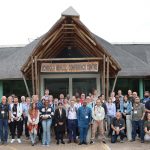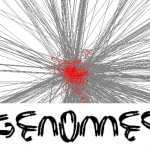Tag Archives: metagenomics
FUNC on Safari: the 6th International Conference on Functional Metagenomics (FMG24)
Chris Hunter - June 26, 2024

FUNC on Safari: Functional Metagenomics conference 2024 at Skukuza, Kruger National Park, South Africa (2nd – 5th June 2024) GigaScience Press were once again proud sponsors of the Functional Metagenomics conference (FMG24). Functional Metagenomics is an area of interest for the journal, particularly via our MetaFUNC thematic series. This, the 6th installment of the conference, was held in […]
One group of bacteria to rule them all
Hans Zauner - March 26, 2021

New research in GigaScience reveals a previously hidden diversity of symbiotic Rickettsia bacteria. The new data are also relevant for studying human and animal diseases that are caused by some types of Rickettsia.
iMicrobe: Fostering Community-Driven Science and Data Discovery. Q&A with Bonnie Hurwitz
Nicole Nogoy - August 2, 2019

Author Q&A with Bonnie Hurwitz on the iMicrobe platform for open science and metagenomics, relevant to our FAIR principles and reproducible research.
FUNC in the Fjords: Functional Metagenomics 2019 in Trondheim
Nicole Nogoy - July 27, 2019

The Norwegian city of Trondheim seemed the place to be this June – with hotels in high demand due to the BarCode Of Life conference, The Big Challenge Science Festival (including a concert by that famous science communicator Sting), and the Functional Metagenomics 2019 conference (#FMG2019) all taking place over the same period (June 16-19th). […]
Mock the Metagenome. Author Q&A with Nick Loman & Sam Nicholls
Scott Edmunds - May 15, 2019

The mock metagenome, MAGs and breaking the first rule of Long Read Club Out today in GigaScience is a new “mock metagenome” Data Note from the Nick Loman lab in Birmingham showcasing the latest long-read sequencing technologies from Oxford Nanopore. Having published the first nanopore E. coli genome with us in 2014 showcasing the then […]
Meet the GigaScience ICG Prize Winner, Pt. 2: Lisa Johnson Q&A
Scott Edmunds - December 14, 2018

Yesterday we published the winning paper of the second GigaScience prize, with additional detail and coverage in GigaBlog describing why we and the judging panel found it so novel. This was an impressively case study in reproducibility, reassembling & reannotating around 700 microbial eukaryotic transcriptomes to demonstrate this approach can aid in revealing new biologically relevant […]
Reprocessing the Microbial Genomic Goldmine: Winner of the ICG13 Prize
Scott Edmunds - December 13, 2018

Out today is the winner of our ICG13 Prize, presenting work that can aid in revealing new biologically relevant findings and missed genes from previously generated transcriptome assemblies. Teaching old data new tricks, and maximising every last nugget of information from previously funded research. Here we present some insight into why the reviewers and judges […]
Making sense of pangenome networks
Hans Zauner - October 15, 2018

Navigating Pangenome’s Labyrinth In the two decades since the first genomes were sequenced, with the exponential growth of new and closely related genomes it has become increasingly difficult to visualise and compare their structure. Particularly with the large diversity and difference in genes within microbial genomes. A new computational pipeline, published in GigaScience, makes it […]
Of Mice and Men (and Monkey) Microbiomes.
Scott Edmunds - August 31, 2018

New work in GigaScience introduces the macaque monkey to the microbial gene catalogue club, with the monkey microbiome joining other model organisms.
Reproducible Research Resources for Research(ing) Parasites
Scott Edmunds - June 3, 2016

Two new research papers on scabies and tapeworms published today showcase a new collaboration with protocols.io. This demonstrates a new way to share scientific methods that allows scientists to better repeat and build upon these complicated studies on difficult-to-study parasites. It also highlights a new means of writing all research papers with citable methods that can be updated over time.